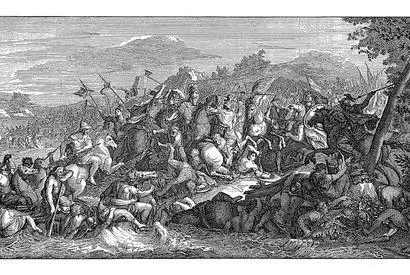Abstract: The article highlights the importance of John Boyd’s emphasis on the importance of Orientation within his well-known Decision Cycle (often known as OODA loop). The story of the US Major League Baseball team, the Oakland Athletics, described in the movie, and the book Moneyball is used as an exemplar as the benefits of not accepting convention and re-orienting thinking. It provides a lesson on the importance of both challenging conventions, not dismissing outlier views and placing a priority of effort into understanding the problem that sits before a strategic planner.
Bottom-line-up-front: Understanding a problem includes questioning norms. Take the time to understand “outliers”; they offer a very high return on investment.
Problem statement: How to beat competitors that can spend far more resources than me?
So what?: Test personal and organisational assumptions, be wary of dismissing the unconventional, and ensure problem understanding.

Source Mameraman/Shutterstock.com
John Boyd’s most enduring contribution to strategic understanding is the well-known decision cycle or OODA loop[1](Observe-Orient-Decide-Act). Boyd would further refine the cycle incorporating feedback loops and answering the question, is any part of the cycle more critical than any other? Boyd deduced that the vital element was Orientation. A fine verification of this is found inside the multi-million-dollar sports machine that is U.S. Major League Baseball, and a once-obscure team known as the Oakland Athletics (A’s). There is a lesson here for anyone interested in strategy and planning, do not ignore perceived outliers or the unconventional. Additionally, the priority of effort needs to go into understanding the problem before you embark on finding solutions.
The Brad Pitt-led film Moneyball tells the story of the Oakland A’s, the film does not require you to be a sports enthusiast and is entertaining simply as a piece of storytelling. The film centres on Billy Beane, the General Manager, who took an analytical approach to player recruiting, at the time viewed as unconventional and breaching well-established traditions in a sport where tradition was dogma. His problem “How do I beat teams that can spend far more money than me?”. The results of this approach, a winning run yet to be surpassed and a team that finished on top of its league table after having lost star players at the end of the previous season.
The film, is a dramatization, to fully understand the depth of Beane’s drive and character and the birth of a new approach to baseball, the equally fascinating but slightly dry book that inspired the movie, Moneyball: The Art of Winning an Unfair Game by Michael Lewis[2] needs to be read. Lewis spent that famous winning season with the Oakland A’s. Not only covering the season but taking you back in time to the personalities and analysis of baseball that defied convention. People and analysis ignored by both the League and the big money teams. The reason why it was ignored is, unfortunately, more straightforward than the analysis itself; it was not ‘how things were done’. No sacred cow or attempt to obtain advantage was left unchallenged by Beane, including players leaving the dugout to go down to a video booth to analyse a pitcher during the game, before returning to bat.
Billy Beane and his host achieved something remarkable, over three years Oakland in terms of player salaries paid about half a million dollars per win. Only one other team was in six figures; some teams were at the three million dollars per win mark. The Oakland A’s were six times more efficient and revitalised their supporter base. Lewis surmises the ability to re-think the game, to pick out inefficiencies and how to play with who was totally different from any other team at the time. His disciples would leave Oakland and spread Moneyball. They took a hard-nosed approach on what was needed to win games, not just building teams of perceived ‘star’ players (though they do matter, you just need the right ones).
Boyd was in many ways like Beane, an iconoclast who did not accept norms, like Beane it would be others who would take his ideas further and extend them.
The value to us, as mere mortals, is to take the time to listen to and understand these outliers; they, in both cases, offer a very high return on investment.
The critical lesson of Moneyball and the work of John Boyd is probably best summed up from another favourite movie of mine The Big Short (and that movie and book are very close).
“While the whole world was having a big old party, few outsiders and weirdos saw what no-one else could…These outsiders saw the giant lie at the heart of the economy, and they saw it by doing something the rest of the suckers never thought to do.
They looked.”
So next time you start planning, perhaps test your own personal and organisational assumptions first; and be wary of dismissing the unconventional; oh, and make sure you understand the problem.
Jason Thomas is a retired Australian Army Armour Officer who is currently undertaking a PhD into Mission Command, he is an occasional blog writer for a variety of sites and maintains an interest in particular in strategic decision making. The views contained in this article are the author’s alone.
[1] Robert Coram, Boyd, The Fighter Pilot that changed the Art of War (New York: Hachette Book Group, 2010).
[2] Michael Lewis, Moneyball, The Art of Winning an Unfair Game (New York: Norton & Company, 2004), passim.






